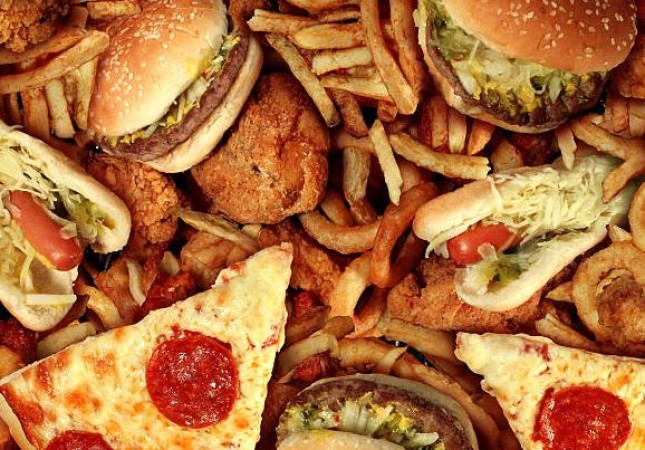
Getting a good night’s sleep and maintaining optimal health are essential for our overall well-being. However, did you know that what you eat for dinner can significantly impact your sleep quality and overall health? Certain foods consumed close to bedtime can disrupt sleep patterns, cause discomfort, and even affect digestion. In this article, we will explore 10 foods that you should avoid eating during dinner time to promote better sleep and enhance your overall health. By making mindful choices about your evening meals, you can ensure a restful night’s sleep and wake up feeling refreshed and energized, let’s dive in and discover which foods to steer clear of in the evening for improved sleep and well-being.
10 Foods to Avoid at Dinner –
1. Fat-Rich Food –
Consuming fat-rich food during dinner is often discouraged because it takes longer to digest, potentially causing discomfort and disrupting sleep. High-fat meals are also calorie-dense, increasing the likelihood of weight gain if eaten late at night when the body’s metabolism is slower. Choosing lighter, nutrient-dense options for dinner is generally considered a healthier choice.
2. Deep Fried Food –
Deep-fried food is generally advised to be avoided during dinner due to several reasons. It is high in unhealthy fats and calories, which can contribute to weight gain and increase the risk of heart disease. The frying process can also lead to the formation of harmful compounds. Opting for healthier cooking methods like grilling, baking, or steaming is recommended.
3. Starch Rich Food –
Avoiding starch-rich foods during dinner is often recommended for several reasons. Starches, such as bread, rice, and pasta, are high in carbohydrates, which can cause a spike in blood sugar levels. Consuming them in excess during dinner can lead to energy crashes, weight gain, and potential sleep disruption. Choosing lighter, low-carbohydrate options may promote better digestion and overall health.
4. Spicy Food –
Spicy food is often advised to be avoided during dinner for a few reasons. Spices can irritate the digestive system, leading to indigestion or acid reflux, especially when lying down to sleep. Spicy foods can stimulate the production of gastric acid, potentially causing discomfort and disturbed sleep. Opting for milder flavors in the evening may promote better digestion and sleep quality.
5. Sweets –
Avoiding sweets during dinner is recommended for a few reasons. Sweets are typically high in sugar and can cause rapid spikes in blood sugar levels, followed by crashes that leave you feeling lethargic. Consuming sweets close to bedtime can also disrupt sleep patterns and contribute to weight gain. Choosing healthier, lower-sugar options for dessert or avoiding sweets altogether can support better overall health.
6. Simple Carbohydrates –
Simple carb-rich food such as white bread, pasta, and sugary snacks, are often advised to be avoided during dinner for a few reasons. They can cause rapid spikes in blood sugar levels, followed by crashes, which can disrupt sleep and leave you feeling tired. Choosing complex carbs like whole grains, fruits, and vegetables provides more sustained energy and better digestion.
7. Alcohol –
Avoiding alcohol during dinner is recommended for several reasons. Alcohol can impair digestion, leading to nutrient malabsorption and discomfort. It can also disrupt sleep patterns, resulting in poor-quality rest. Additionally, alcohol is calorie-dense and can contribute to weight gain. Opting for non-alcoholic beverages or moderate alcohol consumption with a meal is generally a healthier choice.
8. Cruciferous Vegetables –
Cruciferous vegetables, such as broccoli, cauliflower, and cabbage, are generally nutritious but can cause digestive discomfort for some individuals when consumed in large quantities during dinner. These vegetables contain compounds that can cause bloating and gas. However, moderation and proper cooking methods can help minimize these effects, making them a valuable part of a balanced dinner.
9. Chocolate –
While chocolate can be a delicious treat, it is often advised to be avoided during dinner for a few reasons. Chocolate is high in sugar and can lead to energy crashes and disrupted sleep patterns. It contains caffeine, which can interfere with falling asleep. Enjoying chocolate earlier in the day or opting for healthier dessert alternatives is recommended.
10. Salty Food –
Avoiding salty foods during dinner is advisable for a few reasons. High-sodium foods can lead to water retention and bloating, making you feel uncomfortable. Excessive sodium intake can also contribute to high blood pressure and an increased risk of cardiovascular issues. Opting for lower-sodium options or using herbs and spices for flavoring can help promote better overall health.
Also read: Unleashing Power of Superfoods: A Guide to Boosting Your Health